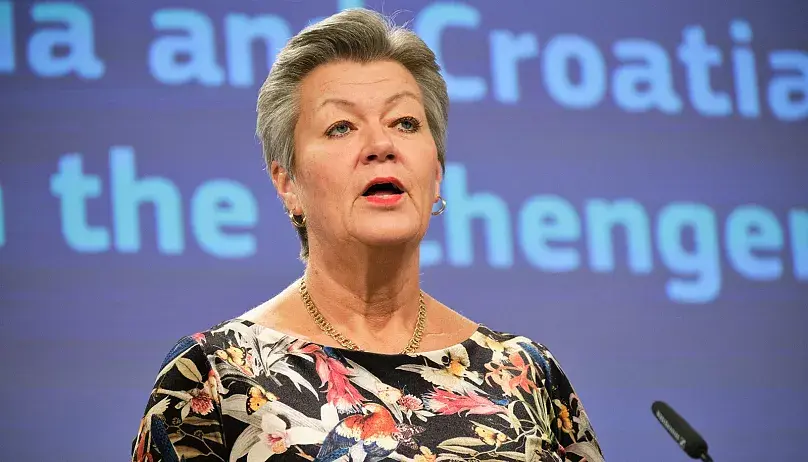euronews (in English)| 2022-11-17 02:32:48
Croatia, Bulgaria and Romania are "ready" to join the passport-free Schengen Area after having "strongly proven" they meet all the necessary criteria, the European Commission has said.
Schengen enables cross-border travel without the need to carry a passport or pass through border controls. It currently encompasses 26 nations, including 22 EU countries, and almost 420 million citizens.
"It's high time to say welcome," Ylva Johansson, the EU's home affairs commissioner, said on Wednesday while unveiling a new report that argues in favour of the three countries' readiness.
"Schengen is Europe. These three member states deserve to feel fully European," she said.
"The wait has been long, I should say, too long. Expectations are high, rightly so, from authorities but not at least citizens."
Schengen has boosted the EU's economy and lifted standards of living since it was established back in 1995, Johansson said, calling on member states to take a "decision in all our interest" and approve the pending candidacies without any further delay.
The European Commission's unconditional endorsement comes in the lead-up to a high-stakes meeting of interior ministers in December, where the issue of Schengen accession will come back to the table.
A unanimous vote is needed to admit new members.
Joining Schengen requires, among other things, the application of common rules, proper management of external borders, sharing of security information and efficient police cooperation.
The three countries "have the tools, structures, and procedures in place," Johansson said, praising their strong record and legal commitments.
So far, this has not been enough for Croatia, Bulgaria and Romania, who have been waiting for years to join the passport-free area – a legal requirement for any country that enters the European Union.
Croatia completed its evaluation process in 2020 and received a positive assessment in December 2021.
In the case of Bulgaria and Romania, the wait has stretched over more than a decade. The Commission confirmed the countries' readiness back in 2011 and has repeatedly called on member states to grant admission.
The European Parliament has passed several resolutions – one as recently as October – calling their continued exclusion "discriminatory" and demanding immediate accession.
Initially, the twin bids of Bulgaria and Romania were opposed by France, Germany, Finland, Sweden, the Netherlands and Belgium over concerns related to corruption, organised crime and judicial reforms.
Gradually, though, the opposition eased. This year saw both French President Emmanuel Macron and German Chancellor Olaf Scholz give their support.
"Schengen is one of the greatest achievements of the European Union, and we should protect and develop it. This means, incidentally, closing gaps that remain," Scholz said in late August.
Finland and Denmark have equally softened their positions, Euronews understands.
But last month, the Dutch Parliament adopted a resolution urging the government of Prime Minister Mark Rutte to block the two applications until further investigations are conducted.
Dutch lawmakers argued the prevalence of corruption and organised crime in Bulgaria and Romania posed a "risk to the security of the Netherlands and the entire Schengen Area."
In Sweden, the new right-wing government is struggling to secure enough votes to support the two applications, local media report.

In a bid to win over the remaining sceptics, Sofia and Bucharest invited the European Commission and EU states to organise a fact-finding mission of experts and examine the situation on the ground.
The team of 17 experts visited the two countries in the first half of October. According to Johansson, the findings were "positive" and reaffirmed their readiness to join.
Another mission is now taking place to resolve outstanding questions.
"From the Commission's side, we think all facts are on the table already," Johansson said when asked about the Dutch reticence. "But of course, we stand ready to (provide) any additional answers that is necessary."
All eyes turn now to the EU Council, where politics hold great sway.
The Czech Republic, which currently holds the Council's rotating presidency and is tasked with steering debates, has made Schengen enlargement one of its top priorities.
But the clock is ticking: the next – and likely last – chance that Prague will have to put the long-stalled question to a vote will on 8 and 9 December, when justice and home affairs ministers are scheduled to meet.
Two separate votes will be held: one on Croatia, and another one on Romania and Bulgaria, a Czech spokesperson told Euronews.
Only a unanimous endorsement can abolish checks at all internal borders.
"This will be a truly European decision," Johansson said about the upcoming votes.
"Schengen has survived the turbulence of recent years. These challenges have been surmounted because of a shared European spirit. And this spirit must continue."
Should the three countries be accepted, only two out of the 27 EU member states would remain out of Schengen: Ireland, which voluntarily opted out to maintain its own travel scheme with the UK, and Cyprus, which remains divided between north and south.
From : euronews
Origin article: https://www.euronews.com/my-europe/2022/11/16/croatia-bulgaria-and-romania-are-ready-to-join-schengen-says-european-commission
'Bulgaria Love > 불가리아 뉴스' 카테고리의 다른 글
| 불가리아 최대 태양광발전소 베릴라 가동 (0) | 2023.07.24 |
|---|---|
| Кметът Гелев подписва меморандум за разбирателство с корейци, ще вдигат болница в Сапарева баня (0) | 2023.07.02 |
| They give up to BGN 15,000 for solar panels on the house (0) | 2022.11.03 |
| "법 적용에 무자비할 것" (0) | 2021.12.12 |
| 보리소프 총리 : Razgrad의 새 공장에서 COVID-19에 대한 백신 생산. (0) | 2021.03.23 |



